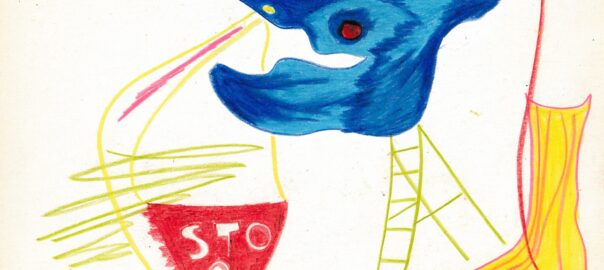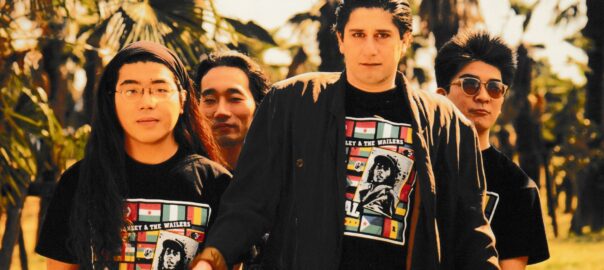“…releasing “old stuff” makes SoSaLa feel like living through these songs.’
memories again, revisiting, re-gaining messages that still ring true, and
collecting what was forgotten. It still gives him what it did back then, maybe
more now.” – Mark C (LIVE SKULL)
 “1994 – Live at CBGB”
“1994 – Live at CBGB”
A Resurrected Masterpiece of Japanese No Wave in NYC
 Artist: SoSaLa
Artist: SoSaLa
Title: 1994 – Live at CBGB
Formats: CD (autographed limited edition of 100 and high-end 24-bit product) and digital album
Cat. #: DBDCD004
Label: DooBeeDoo Rec
UPC Code: 198595498392
US CD Release: December 16, 2024
Digital and CD international releases: January 3, 2025
Digital worldwide distribution by CD Baby
Stream here: https://soundcloud.com/sohrab-saadat-ladjevardi/sets/sosala-1994-live-at-cbgb
Buy here: https://doobeedoobizllc.thrivecart.com/sosala-1994-cd/
© Sohrab Saadat Ladjevardi ℗ DooBeeDoo Worldwide Music / BMI Produced and photos by Sohrab Saadat Ladjevardi
Live recording by legendary producer and sound recording engineer Martin Bisi at CBGB (New York), January 8, 1994
www.Sohrab.info
About the CD
SoSaLa has released his next retrospective recording. This album is a follow-up to the previous album, 1993. This time, he looks back to 1994, a significant year in SoSaLa’s music career. The music from the recording was performed live at CBGB with SoSaLa’s Tokyo quartet, SADATO. It was recorded and mixed by legendary recording engineer and producer Martin Bisi. Despite the recording being meant as a demo and not for release, this retrospective album is another must-have for fans interested in SoSaLa’s unique and accomplished music career.
It is important to place SADATO’s music in its cultural context. No Wave music was experimental and abrasive. It emphasized texture over melody, unconventional song structures, dissonant harmonies, and repetitive driving rhythms. No Wave was closely tied to the contemporary art scene as an underground movement. It was more about artistic expression and pushing boundaries than creating commercially successful music. The movement was short-lived but highly influential in the music world, independent film, fashion, and visual art.
Stylistically, the music on this album has a distinct connection with bands such as DNA, the Lounge Lizards, Suicide, James Chance and the Contortions, Teenage Jesus and the Jerks, and Pere Ubu. SADATO was a fearless pioneer No Wave band in the Japanese independent rock music scene. They presented music to a culture that knew nothing about the No Wave scene in New York. SADATO was ahead of its time and underrated by the critics.
In 1993, SoSaLa (whose artist name was Sadato at that time) recruited Shimizu, Nakamura, and Kato for the band. They started working on new songs and played them in forthcoming gigs, developing and becoming a powerful rocking band…a notorious band representing and advocating the D.I.Y. spirit on and off stage. Angry-sounding but with much love and compassion, they became the only social-political performing band in the Japanese indie music scene, especially in Osaka and Tokyo.
In 1994, twenty songs were ready to be recorded by New York’s legendary recording engineer, mixer, and producer Martin Bisi at B.C. Studio in Brooklyn, NY. This would be the second time SADATO would record with him. His exceptional mixing talent brought out the best in SADATO’s music.
After finishing the recording, CBGB invited SADATO to perform two shows within a week. Bisi recorded the performances, skillfully capturing the audience’s enthusiastic reactions to SADATO’s solos, rhythm changes, odd rhythms, noise, and lyrics. Eight songs would appear on the 1995 album SADATO No More Reggae (Musical Strategies, Germany).
Their performance at the legendary New York City music venue CBGB is a triumphant return of a prodigal musical son. Founded on the Bowery in New York City by Hilly Kristal in 1973, CBGB was originally intended to feature country, bluegrass, and blues. It unexpectedly became a forum for American punk, new wave, No Wave, hardcore, and other underground music genres. The list of people and bands starting at CBGB reads like a history of New York rock music. A short list includes the Ramones, Blondie, Talking Heads, Misfits, Mink Deville, Television, Patti Smith Group, The Dead Boys, The Dictators, Live Skull, Suicide, Bad Brains, Television, the B-52s, Voivod, John Lurie and the Lounge Lizards, Pere Ubu, The Cramps, Joan Jett, Warzone, Agnostic Front, Murphy’s Law, Cro-Mags, Living Colour, The Police, Gorilla Biscuits, Sick of It All, Youth of Today, Sum 41, Korn, Green Day and Guns n Roses.
On this album, SoSaLa, aka Sadato, seamlessly blends Ornette Coleman‘s Harmolodic Free-Jazz form and No Wave indie rock to enhance every element the music draws on. The succinct song structures provide a perfect foil for his masterful improvisations on the soprano and tenor saxophones. Sadato’s “dadaist” vocals touch on social and political issues. Each song features lyrics executed in Sprechgesang style. His voice is powerful and precise, singing, shouting, and speaking in English, German, Japanese, and Farsi. The contributions by his musicians, Masaki Shimizu on fretless bass and backing vocals, Ryo Kato on drums and backing vocals, and Toshimaru Nakamura on electric guitar, bring unique dimensions and startling voices to the SADATO sound. The music sat well with rock and jazz and transcended both simultaneously.
No Wave, free jazz, rock, funk, and dada meet in the vitality and celebration of a live music event. Listening to this album, one relives the days of an earlier age when musicians fearlessly experimented with forms and concepts. Where old rules were broken, and new ones were being written – and broken. Sadato had the vision – and balls – to introduce No Wave into the Japanese independent rock music scene and make it work. It is clear evidence of Sadato, Shimizu, Kato, and Nakamura’s skills, talent, and charisma that they made this music accepted in a foreign environment.
About SoSaLa, aka Sadato’s Tokyo Days
While living in Tokyo, Japan, between 1984 and 2008, Sadato joined forces with other Tokyo musicians and formed SADATO in 1988. They toured Europe, the United States, and Hong Kong and released five CDs on KAMPAI Rec, POP BIZ Rec, and German labels. Sadato was also featured on various compilations.
Sadato was one of Japan’s first foreign indie musicians to create music with the DIY spirit by starting his music company, POP BIZ Ltd. (an in-house label, distributor, publisher, booking agency, promotor, festival producer, and music paper publisher). As a leader, he financially supported and paid his band members fairly.
New York videographer Stephen Black was a fan and became friends with Sadato. Black produced and directed three SADATO short films in Tokyo, New York, and Hong Kong.
Sadato’s music was beyond genre, fusing free jazz, progressive rock elements, and performance art with world music, especially the Persian influences from his native Iran. He was the voice of No Wave in Japan.
Sadato was outspoken and confident in communicating with his audience on and off stage. Critics called him “Nazo no Sadato” (“Weird Sadato”) because of his charismatic stage presence and highly original music. Despite his idiosyncratic image, he was respected by many people in the Tokyo artistic circles. These included jazz, punk, and noise musicians and composers, Japanese classical musicians and composers, Butoh dancers, and Kyogen actors. Among his admirers were Machida Machizo, Haino Keiji, Merzbow, Friction, Totsuzen Danball, STALIN, Hideo Yamaki, Ryuichi Sakamoto, Otomo Yoshihide, Akira Sakata, Yosuke Yamashita, Maro Akaji, Akira Shigeyama, Onde Goza, and many others.
SADATO’s members consisted of the cream of Tokyo’s musician community. SoSaLa’s favorite SADATO formation was from 1993 to 1999, consisting of Sadato on saxes and vocals, Masaki Shimizu on fretless bass and back vocals, Ryo Kato on drums and back vocals, and Toshimaru Nakamura on electric guitar. (After Nakamura left the band in 1995, Tatsuya Watanabe on Hammond B3 organ and backing vocals took over his spot.)
Although Sadato was the leader and frontman, the SADATO sound was a group effort. All members were accomplished and top musicians. The rhythm section played exceptionally well, giving the vocalists and soloists space and freedom to move melodically. Owing to the musician’s improvisational skills, composed songs would take unexpected turns. Their performances transcended mere entertainment. They told stories and engaged audience participation.
Their unique concerts were presented at Tokyo’s major punk, progressive rock, heavy metal, alternative/noise, and jazz clubs, such as Anti Knock, Crocodile, Mandela, Heaven’s Door, Ink Stick, Club Quattro Shibuya, Romanishes Café, Silver Elephant, Yaneura, Jittoku, Yumeya, Theatre Poo; and the Yokohama Jazz Parade. SADATO was also invited to open for foreign indie rock bands such as THE BLECH (Germany), Pachinko Fake (Germany), FUGAZI (US), and Gallon Drunk (UK).
The Japanese press received SATADO’s music and performances well. They enjoyed great concert and CD reviews in indie music magazines (Studio Voice, Cross Beat, Jazz Critics, Music Magazine, PUL-O, Fool’s Mate, Marquee, Musee, etc.) and significant music magazines (Swing Journal, Rockin’ On, Olive, Billboard Japan, POP EYE, Takarajima, Jazz Life, etc.); and primary English and Japanese newspapers, such as Asahi Evening News, Asahi Graph, Japan Times; and Tokyo Journal. Sadato also was interviewed on many radio shows, such as TBS Radio, INTER FM, NHK FM, and Shibuya FM 78.4.
The legendary John Zorn, a musician from New York and founder of Tzadik Records, visited and performed regularly in Japan in the 1990s. He became a fan of SADATO, and Sadato later became friends.
Owing to Sadato’s commitment to his work at POP BIZ, he reluctantly disbanded SADATO in 1999.
About the Contributing Musicians
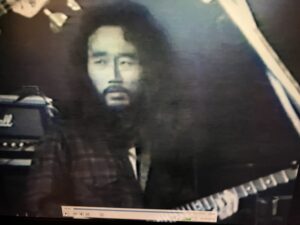 Toshimaru Nakamura (electric guitar)
Toshimaru Nakamura (electric guitar)
Nakamura started his music career playing the electric guitar in various bands before joining SADATO (1991-1995) and recorded two CDs with them. 1992, Nakamura formed his own A Paragon of Beauty and released a CD in 1995. In 1997, he gave up playing his guitar for personal and musical reasons. He started to produce electronic music, becoming well-known internationally in the ONKYO scene by making electronic sounds with a No-Input Mixing Board. In addition to releasing solo projects and collaborations, he performs live concerts in Tokyo, Europe, North America, Argentina, New Zealand, Australia, Korea, China, Taiwan, Singapore and Malaysia.
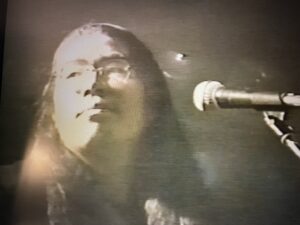 Masaki Shimizu (fretless bass)
Masaki Shimizu (fretless bass)
Shimizu began his professional career while still in university. Subsequently, he played as a session player on recordings and concerts for artists such as Makoto Kawamoto, Ayaya Matsuur, Miki Fujimoto, Morning Musume, and Turf. As a member of the band SADATO, he performed live and recorded in New York and Hong Kong. He has also been active with other bands, including PON, SOH BAND, Gen Hosokawa, and Coyote. He also teaches bass online.
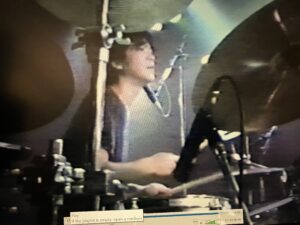 Ryo Kato (drums)
Ryo Kato (drums)
There is not much information about Kato, except that before joining SADATO, he played with various pop bands and was the drum assistant for the well-known drummer Hideo Yamaki, who recorded with SADATO the first CD Tenbatsu (1989). After the breakup of SADATO, he retired from playing the drums and became a truck driver.
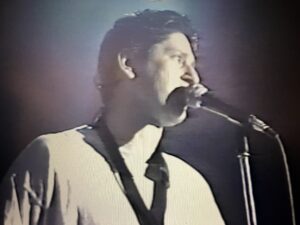 Sadato (tenor and soprano saxophone, vocals)
Sadato (tenor and soprano saxophone, vocals)
After graduating from high school in Hamburg, Germany, Sadato moved to Osaka in 1974 to study martial arts. He majored in Kendo and achieved the 6th Dan rank. Between 1978 and 2008, he led various bands (SADATO GROUP, ALEF, KUSHAMI, SADATO GROUP, DAITAI 99, SADATO, and his last one, The Tehran-Dakar Brothers. His favorite and most-known band was SADATO (1988 – 1989). During this time, SADATO toured Europe, the US, and Hong Kong, released six CDs and three music (short film) videos, and was featured on several local and international compilations. SADATO impacted many local indie musicians and bands.
As a solo artist, he collaborated with dance and butoh groups, acted in indie films, shared the stage, and recorded with local musicians. The highlight of his career was playing with Salif Keita (Mali), Africa’s top singer-songwriter and band leader, at Tokyo’s Blue Note (2001) and in Bamako, Mali (2004).
In 1993, he founded his music company, POP BIZ Ltd. He also made his name as a music journalist and interviewer, interviewing international musicians for the jazz magazine JAZZ CRITICS, such as Don Cherry, Elliot Sharp, Martin Bisi, etc.
About the Tracks
- Yurei (Ghost) 2:25 (English lyrics)
Yūrei are mythological creatures in Japanese folklore analogous to Western ghosts. Sadato used this to express how it feels to be a foreigner and an outsider in Tokyo. The Japanese tend to treat foreigners like ghosts. After Sadato dedicated the performance to Louise Parnassa Staley, Shimizu’s wobbly ostinato, Kato’s relentless drums and Nakamura’s jagged feedback provide a backdrop for Sadato’s howl of frustration from his saxophone.
- Death 6:16 (English and one word of Farsi and Japanese lyrics)
The existential dread of inevitable Death is exorcised and brought to a place of acceptance. Kato’s kick drum pulse and Shimizu’s bass support Sadato’s lyrics. Nakamura’s jagged guitar cuts in and around the sounds. As the band drives the piece forward, Sadato implores, “There’s no reason to fear Death! Die like a gentleman!”
- WER WIE WO WAS WARUM (WHO HOW WHERE WHAT WHY) 3:26 (German lyrics)
In this heavily punk-influenced song, Sadato expresses his disillusionment with his existence. He gives up trying to understand the meaning of life and how to live it. Nakamura’s guitar and Sadato’s saxophone Nakamura articulate the sense of dread and hopelessness.
- Life Drunk 4:12 (English lyrics)
The song is dedicated to the UK band Gallon Drunk. Shimizu’s blues shuffle bass line and Sadato’s uncharacteristically optimistic saxophone improvisation set the stage for his exultations about feeling good about his dramatic life.
- POSTIV JA (Positive Yes) 3:10 (German, English, Farsi, French, and Japanese lyrics)
This song presents Sadato lashing out against people who endlessly complain about everything. He counters their gloominess with “Positivity. Yes, yes, always yes!” This is done in a punk/blues / psychedelic rock song form.
- Tavalod (Birthday) 4:26 (Farsi lyrics)
Kato and Shimizu lay down a groove for Sadato, a framework for his Iranian-influenced soprano saxophone improvisation, and a chant of “Happy Birthday” in Farsi. The idea here is that every day is your birthday—every day, you’re born again.
- 35 Cents Puppy Sandwich 2:45 (English lyrics) – Dedicated to FUGAZI
American post-hardcore band Fugazi was known for its style-transcending music, DIY ethics, manner of business practice, and contempt for the music industry. Sadato uses this song to express his solidarity with Fugazi’s DIY spirit.
- Kurushi Shiawase (Painful Happiness) 3:34 (Japanese lyrics)
In this song, Sadato reflects on the euphoria after intense experiences, such as a painful martial arts fight, a recording session, or what he describes as “Happiness guilt.” As Kato and Shimizu drive a heavy groove, Sadato’s saxophone and Nakmura’s guitar weave fascinating melodies against each other.
- 65 3:44 (English, German, Japanese, and Farsi lyrics)
This is a tribute (almost a love song) to Sadato’s favorite guitar amp, the Fender 65 Deluxe Reverb Amplifier. Sadato’s saxophone part explores some ornamental trills until settling into a counterpoint part for the rhythm section. Nakamura’s guitar answers with the same melody before drifting into dissonant feedback. Shimizu shines on this one. He starts with a dissonant, liquid bass line and ends the song with a brief but awe-inspiring bass solo.
QUOTES
“SoSoLa 1994 Live at CBGB: At times lassoed to earth by blues, funk, and phrygian inspired grooves, the cosmic messengers of this ensemble slingshot into the stratosphere with vocal and instrumental deliveries that command, not ask for your attention. Hold on!” – Lonnie Harrington, New York, 2/17/2025
“SoSaLa – Live at CBGB 1994
SoSaLa’s live album grabs you right from the opening notes of “Yurei”, with a distorted electric guitar soaring over ominous drums and bass, eventually joined by intense vocals. This whole album is powerful music that recalls bits of Primus and Rollins Band (two of my favorite bands from the early 90’s). The rhythm section is incredibly tight, and the guitar player is equally amazing. SoSaLa’s vocals scream into the void, painting word pictures that hang in the air long after the last song ends. Anyone who appreciates this type of cathartic, in-your-face music will love the whole album. Highlights are “Death” and “Positive Ja”. Highly recommended!” – Kevin Keller, New York, 2/12/2025
“SoSaLa/Sadato’s performance on the 1994 Live at CBGB CD is some of the best No Wave music I’ve ever heard. It is high-energy post-punk combined with excellent musicianship, projecting a powerful social/political message that still resonates today. They are in the tradition of the MC5 and even more dynamic, in my opinion.” – David Belmont, New York, January 25th, 2025
“I finally had time to sit down with the 1994 CBGB cd last night. I loved it, and loved hearing how your sound has progressed over the years. Different in many ways from how I’ve heard you, but still retaining your signature sound that I’m familiar with. Awesome stuff.” – Sean Johnson (Booking Agent of The Baltimore Consort), Baltimore, January 17th, 2025
“Wow! I would have never guessed you were a rocker.” –
“I have known Sohrab Saadat Ladjevardi aka SoSaLa since 1985. Our vectors first intersected in Japan, and Japanese culture is an important factor in appreciating Sohrab’s musical aesthetic. His art came into focus during that exciting time in the 1980s when the genre classifications of marketing had not overtaken the music world. Sohrab’s music draws equally from the languages and cultures of free jazz, punk, and funk to form a potent mix outside of any simple branding. He carries that powerful tradition to this day in both his music and organizing work.” – Elliot Sharp (musician), New York, 11/3/2024
“Yeah, Fela would have liked it!” – Rikki Stein (author, producer, Fela Kuti’s manager and friend), London, 8/29/2024
“Man, you’re a real rocker! :-)” – Marc Ribot (musician and music activist), New York, July 27, 2024)
“I can feel the power and passion in your music!” – Morgan Fisher (musician and member of the Mott the Hoople), Tokyo, July 7, 2024
